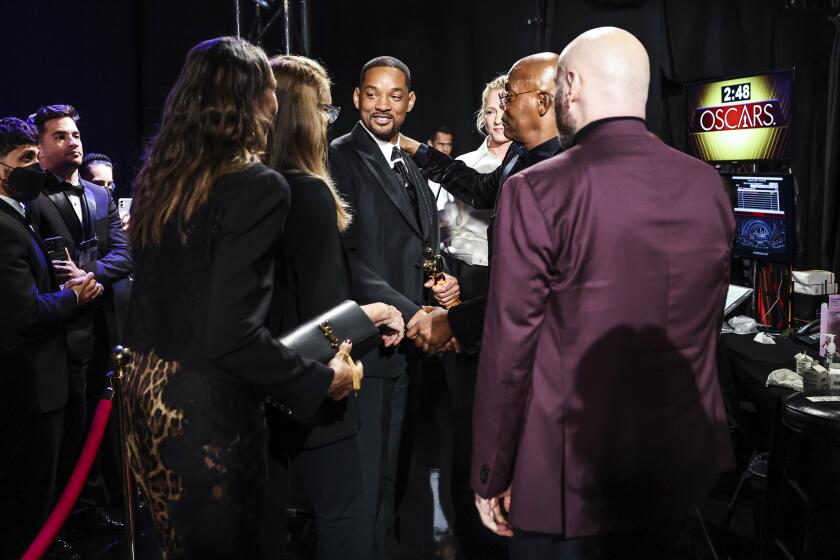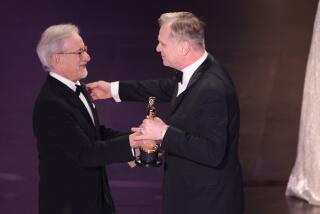With ‘CODA’ best picture win, Apple beats Netflix to Oscar glory

- Share via
Apple paid $25 million for the rights to release “CODA.” It was worth every penny.
“CODA’s” come-from-behind best picture triumph at the 94th Academy Awards delivered a major stamp of legitimacy for Apple and its young original film business, snatching yet another victory from rival Netflix to become the first streaming service to land the Oscars’ most coveted trophy.
Written and directed by Sian Heder, “CODA” charmed academy voters with its feel-good portrayal of a young woman (Emilia Jones), who has to decide whether to help her deaf family’s fishing business or pursue her musical ambitions.
The film prevailed over Netflix’s “The Power of the Dog,” Jane Campion’s twist on the Western genre that for weeks was considered the favorite before “CODA’s” late surge.
‘CODA’ became a feel-good best picture winner and Jessica Chastain triumphed for ‘Tammy Faye,’ but all was overshadowed by best actor winner Will Smith.
“CODA” was Apple’s first nominee for best picture, whereas Netflix has had a string of nominees in its pursuit of the academy’s most desired honor.
The Cupertino tech giant’s $25-million acquisition of “CODA” at last year’s Sundance Film Festival set a record for the festival. Apple somewhat quietly released the movie on Apple TV+ in August.
The big win marks the fast rise of Tim Cook’s iPhone-making behemoth as a bona fide film industry player, after only launching its streaming service in late 2019 to much skepticism within Hollywood. Industry estimates peg Apple’s promotional campaign for “CODA” at more than $10 million, which is typical for a serious best picture contender.
“CODA” won all three of the awards for which it was nominated. Troy Kotsur took home the award for supporting actor, making history as the first male deaf actor to win an acting Oscar. Heder won for adapted screenplay.
The Oscars are in the midst of an identity crisis as they’re saddled with an impossible task of saving movie culture.
It’s the latest narrow defeat for Netflix, which has been pushing hard for Oscars during the last few awards seasons. The firm managed to get seven movies nominated for best picture in four years by backing prestigious directors such as David Fincher (“Mank”), Martin Scorsese (“The Irishman”) and Noah Baumbach (“Marriage Story”). The Los Gatos company came close in 2019 with Alfonso Cuarón’s “Roma,” which won three statuettes, but not best picture.
Netflix didn’t go home empty-handed, thanks to Campion securing the honor for director. Campion is the first woman to have been nominated for best director more than once.
Netflix came to the ceremony as the most nominated studio, with 27 nods for films including Adam McKay’s “Don’t Look Up,” Maggie Gyllenhaal’s “The Lost Daughter,” musical “Tick, Tick... Boom!” animated feature “The Mitchells vs. the Machines” and multiple shorts.
For a steaming service to earn Hollywood’s top accolade is a symbolic moment in the entertainment industry. Sunday’s result is yet another sign of how much Hollywood’s attitude toward the tech takeover has evolved since Amazon became the first streaming studio to field a best picture nominee with 2016’s “Manchester By the Sea.”
It was only three years ago that members of the academy, including Steven Spielberg, led a movement to prevent streaming services such as Netflix, Amazon and Hulu from competing in the Oscars without their projects getting a full theatrical run first.
But the film industry has changed. Streamers are now the most active financial backers of indie films and festival darlings — the types of critically acclaimed movies the academy likes to celebrate.
The COVID-19 pandemic accelerated the shift. With theaters forced to close, audiences grew accustomed to watching movies debut on their living room TV screens, rather than at the local multiplex. Convenience won out over the lauded theatrical experience for many fans.
2022 Oscar winners full list, including ‘CODA,’ ‘Dune’ and Will Smith
Three of the best picture nominees — “The Power of the Dog,” “CODA” and “Don’t Look Up” — were released by streaming companies. Warner Bros.’ “King Richard” and “Dune” debuted simultaneously on HBO Max and in theaters, as the company temporarily adapted its strategy for the lingering public health crisis.
Victory didn’t come cheap. Streaming services have spent vast sums of money to get into the pantheon of Oscar winners. Studios blanketed the Los Angeles area with billboards, TV spots, social media promotion and full-page spreads in newspapers and trade publications.
Warner Bros. was the winningest studio overall with seven total victories, including six for Denis Villeneuve’s adaptation of Frank Herbert’s “Dune” and one for “King Richard.” “Dune” dominated the technical categories. The science fiction visual stunner, produced by Legendary Pictures, won production design, sound, film editing, original score, cinematography and visual effects.
Will Smith won his long-awaited lead actor award for his performance as the patriarch Richard Williams in “King Richard.” He accepted the award shortly after slapping Chris Rock onstage during the telecast after the comic made a joke about Smith’s wife, Jada Pinkett Smith.
Walt Disney Co. scored six kudos for movies including Steven Spielberg’s “West Side Story” remake, which won for supporting actress (Ariana DeBose). Lead actress went to Jessica Chastain for the title role in Disney unit Searchlight Pictures’ “The Eyes of Tammy Faye,” which also won for makeup and hairstyling. Disney’s Colombian-set musical phenomenon “Encanto” won for animated feature. Other Disney winners were Questlove’s “Summer of Soul” (from Searchlight and Hulu) for documentary feature, and “Cruella” for costume design.
Several studios won a single award. MGM’s “No Time to Die” won original song for Billie Eilish and Finneas O’Connell’s James Bond theme. Focus Features’ “Belfast,” set in the turmoil of 1960s Northern Ireland, won original screenplay for Kenneth Branagh. Sideshow and Janus Films’ Japanese film “Drive My Car,” directed by Ryusuke Hamaguchi, took home the Oscar for international feature.
More to Read
Inside the business of entertainment
The Wide Shot brings you news, analysis and insights on everything from streaming wars to production — and what it all means for the future.
You may occasionally receive promotional content from the Los Angeles Times.














